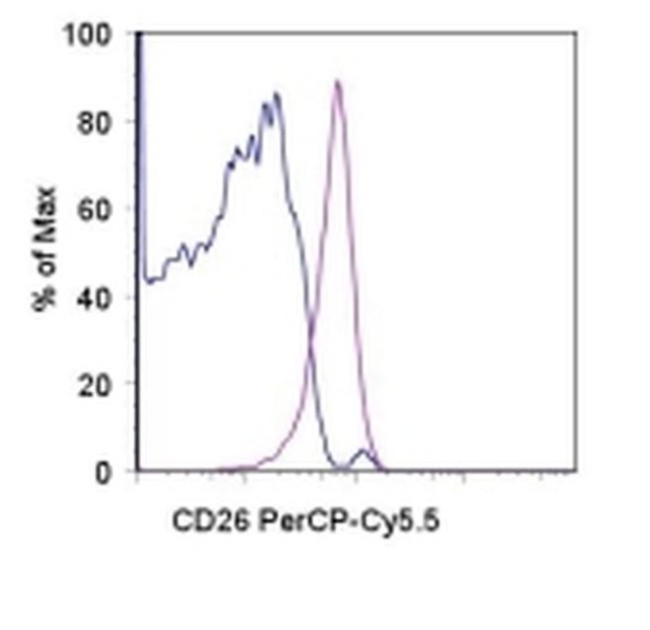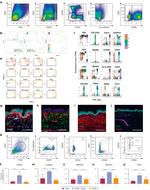Search Thermo Fisher Scientific
Invitrogen
CD26 Monoclonal Antibody (H194-112 (H194-112.12.4.4.5)), PerCP-Cyanine5.5, eBioscience™
Product Details
45-0261-82
Species Reactivity
Published species
Host/Isotype
Recommended Isotype Control
Class
Type
Clone
Conjugate
Excitation/Emission Max
Form
Concentration
Purification
Storage buffer
Contains
Storage conditions
Shipping conditions
RRID
Product Specific Information
Description: The monoclonal antibody H194-112 recognizes mouse CD26, a thymocyte-activating molecule (THAM). CD26 is a surface expressed and soluble ectoenzyme (dipeptidyl peptidase IV) that cleaves dipeptides from the amino terminus of proteins. In particular CD26 has been shown to cleave CXCL12, CCL22, neuropeptide Y and glucagon. CD26 is involved in adhesion, apoptosis, disease regulation, and engraftment. Expression is regulated during thymic development at the messenger RNA level. Additionally, CD26 protein is found on thymocytes, a percentage of resting B cells, stimulated B cells, NK cells and a percentage of resting and activated T cells and other epithelial cell types. On human cells more CD26 protein is found on Th2 cells. Functional CD26 is expressed on Sca-1+c-Kit+lin- cells. This expression has been shown to correlate with mobilization of progenitor cells. Inhibition of CD26 activity through a variety of compounds enhances allogenic stem cell homing and engraftment.
This antibody is reported to have activating function.
Applications Reported: This H194-112 (H194-112.12.4.4.5) antibody has been reported for use in flow cytometric analysis.
Applications Tested: This H194-112 (H194-112.12.4.4.5) antibody has been tested by flow cytometric analysis of mouse splenocytes or thymocytes. This can be used at less than or equal to 1 µg per test. A test is defined as the amount (µg) of antibody that will stain a cell sample in a final volume of 100 µL. Cell number should be determined empirically but can range from 10^5 to 10^8 cells/test. It is recommended that the antibody be carefully titrated for optimal performance in the assay of interest.
Excitation: 488 nm; Emission: 695 nm; Laser: Blue Laser.
Filtration: 0.2 µm post-manufacturing filtered.
Target Information
CD26 (dipeptidyl peptidase IV, DPP IV), adenosine deaminase (ADA) binding protein) is a homodimeric atypical serine protease belonging to the prolyl oligopeptidase family. CD26 is expressed on lymphocyte cells and is upregulated during T-cell activation. CD26 is also expressed on activated B cells and natural killer cells and abundantly on epithelia. CD26 is implicated in a variety of biological functions including T-cell activation, cell adhesion with extracellular matrix such as fibronectin or collagens, and in HIV infection. CD26 identical to adenosine deaminase complexing protein-2, and to the T-cell activation antigen CD26. Further, CD26 is an intrinsic membrane glycoprotein and a serine exopeptidase that cleaves X-proline dipeptides from the N-terminus of polypeptides. Alterations in CD26 peptidase activity are characteristic of malignant transformation, and the enzymatic activity increases dramatically with tumor grade and severity. CD26 is expressed in various blood cell types, but also in cells that are histogenetically related to activated fibroblasts. Alterations in CD26 density have been reported on circulating monocytes and CD4+ T cells during rheumatoid arthritis and systemic lupus erythematosus.
For Research Use Only. Not for use in diagnostic procedures. Not for resale without express authorization.
How to use the Panel Builder
Watch the video to learn how to use the Invitrogen Flow Cytometry Panel Builder to build your next flow cytometry panel in 5 easy steps.
Bioinformatics
Protein Aliases: CD26; Dipeptidyl peptidase 4; Dipeptidyl peptidase IV; DPP IV; DPP-IV; T-cell activation antigen CD26; THAM; Thymocyte-activating molecule
Gene Aliases: Cd26; Dpp-4; Dpp4; THAM
UniProt ID: (Mouse) P28843
Entrez Gene ID: (Mouse) 13482

Performance Guarantee
If an Invitrogen™ antibody doesn't perform as described on our website or datasheet,we'll replace the product at no cost to you, or provide you with a credit for a future purchase.*
Learn more
We're here to help
Get expert recommendations for common problems or connect directly with an on staff expert for technical assistance related to applications, equipment and general product use.
Contact tech support




